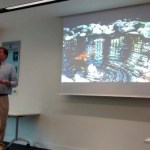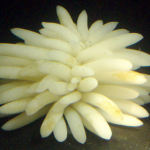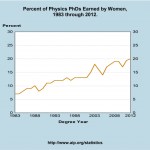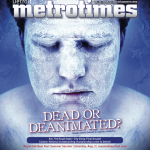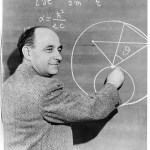Science
It's another Dawkins question!
Why do cave-dwellers lose their eyes? They’re useless, but are they harmful? Costly to make? Or eroded by rain of uncorrected mutations?
I thought I'd already addressed this in a blog post long ago, but I searched, and I didn't -- it was my inaugural column in sadly defunct Seed magazine, way back in the paleolithic, I think. Fortunately, I still have the copy I sent in to the editor, so I resurrect it here.
Degeneration and developmentIt’s not disuse that leads to loss of organs in evolution, but competitive genetic interactions
Reduced or degenerate organs,…
Ophelia has summarized a series of science questions Richard Dawkins asked on Twitter. Hey, I thought, I have answers to lots of these -- he probably does, too -- so I thought I'd address one of them. Maybe I can take a stab at some of the others another time.
I like this one, anyway:
Why do cells have the complete genome instead of just the part that’s needed for their function? Liver cells have muscle-making genes etc.
My short answer: because excising bits of the genome has a high cost and little benefit, and because essentially all of the key exaptations for multicellularity evolved in…
A lot of medical specialties have throwaway newspapers/magazines that are supported by advertising and somehow mysteriously managed to show up for free in the mailboxes of their practitioners. In my case, I’ve found myself on the subscription list for such papers about oncology, but, given that I trained as a general surgeon. I’m Board-certified as a general surgeon. When I have to recertify in about three years, it will be as a general surgeon, which was really fun to try to do last time after having specialized as a breast cancer surgeon and will likely be even more fun next time, when I…
There are times when supporting science-based health policy and opposing health policies that sound compassionate but are not are easily portrayed as though I’m opposing mom, apple pie, and the American flag. One such type of misguided policy that I’ve opposed is a category of bills that have been finding their way into state legislatures lately known as “right to try” bills. Jann Bellamy over at SBM and I have both written about them before. With the passage of the first such bill into law in Colorado in May, followed by Missouri and Louisiana, and its heading to the voters of Arizona as…
Kate and I had a very nice time doing touristy things in Bath yesterday during the day-- old church, very old hot spring, Georgian architecture-- then went on to Bristol where I gave a talk on the forthcoming book, as you can see in the picture above. I would ordinarily include a SlideShare link to the slides I used for the talk, but the talk is so image-heavy and the hotel wi-fi so grindingly slow that I'm not even going to attempt uploading it.
The first bit, as you might guess from the photo above, was basically the same as my TED@NYC talk last fall, making an analogy between the…
I come across antivaccine editorials all the time. Usually, some editor ignorant of the issues involved is duped by antivaccine arguments or succumbs to the annoying journalistic fallacy (with respect to science) of “telling both sides.” Either that, or the editor has antivaccine proclivities himself. Either way, the result is an op-ed by someone like Barbara Loe Fisher, one of the clown car crew over at at the antivaccine crank blog Age of Autism, or one of the drinking moms over at the horribly misnamed “The Thinking Moms’ Revolution.” I’ve seen so many of them and dealt with the same…
One of the most annoying phenomena when it comes to “complementary and alternative medicine” (CAM), which its advocates are more and more insistent on calling “integrative medicine” is how little the average doctor cares that pseudoscience is infiltrating medicine. The reason, of course, is that CAM advocates don’t like the “alternative” part of the term CAM. Come to think of it, they don’t like the “complementary” part, either, because it implies that conventional science-based medicine (what I like to refer to as “real” medicine) is the main treatment and what they do is just “…
We know a lot about the sexy bits of male cephalopods — ask about hectocotyl arms and spermatophores sometime — but would you be surprised to learn that we don't know much at all about squid ladybits? Of course you wouldn't.
Not infrequently, I’m asked why it is that I do what I do. Why do I spend so many hours of my free time, both here and at my not-so-super-secret other blog (NSSSOB), to write my detailed analyses of various forms of quackery, analyses of scientific studies, and expressions of my dismay at the infiltration of pseudoscience into medicine, particularly medical academia in a phenomenon I like to call “quackademic medicine”? One reason, of course, is because I passionately believe in what I am doing. Another reason is that I want information countering various forms of dubious medicine to be out…
Our little hangout thing is now old enough to drink, in episode-years anyway, and to celebrate, we finally figured out how to get live audience feedback during the hangout. Which takes the first couple of minutes of the video, because we're highly trained professional scientists.
Once we got that sorted, we talked about a bunch of stuff, including but not limited to crazy space drives, the history of major concepts in physics, space probes and asteroids, and "native advertising" and how it relates to blog history. Some links:
-- My post on the impossible space drive, which has links to…
Over at FiveThirtyEight, they have a number-crunching analysis of the number of papers (co)authored by women in the arxiv preprint server, including a breakdown of first-author and last-author papers by women, which are perhaps better indicators of prestige. The key time series graph is here:
Fraction of women authors on the arxiv preprint server over time, from FivethirtyEight.
This shows a steady increase (save for a brief drop in the first couple of years, which probably ought to be discounted as the arxiv was just getting started) from a bit over 5% women in the early 90's to a bit…
It's been 25 years since Gould's Wonderful Life: The Burgess Shale and the Nature of History crystallized the debate over the importance of contingency in evolution, most famously illustrated by his metaphor of "replaying the tape of life". If we could roll back the history of life on earth and restart it in the pre-Cambrian, would we see the same forms arise again? Would we have dinosaurs a few hundred million years later, and bipedal intelligent apes after a half billion years?
Gould's answer was no -- that the role of chance was too great, and because the forms of life do not represent…
I've gotten a few queries about this "Impossible space drive" thing that has space enthusiasts all a-twitter. This supposedly generates thrust through the interaction of an RF cavity with a "quantum vacuum virtual plasma," which is certainly a collection of four words that turn up in physics papers. An experiment at a NASA lab has apparently tested a couple of these gadgets, and claimed to see thrust being produced. Which has a lot of people booking tickets on the Mars mission that this supposedly enables.
Most physicists I know have reacted to this with some linear combination of "heavy sigh…
We all seek immortality in some way. Death has been a terror of nearly all since humans first started realizing that everybody dies. After all, no one wants to face the end of everything that one has been, is, and will be, so much so that a key feature of many religions is a belief that death is not the end, that there is an afterlife where we will all live forever and where evil is punished and good rewarded. Even if, as seems most likely, death is simply the end, and the time after death is just like the time before we were born (or, more properly, before our first memories), something that…
Given the recent Feynman explosion (timeline of events), some people may be casting about looking for an alternative source of colorful-character anecdotes in physics. Fortunately, the search doesn't need to go all that far-- if you flip back a couple of pages in the imaginary alphabetical listing of physicists, you'll find a guy who fits the bill very well: Enrico Fermi.
Fermi's contributions to physics are arguably as significant as Feynman's. He was the first to work out the statistical mechanics of particles obeying the Pauli exclusion principle, now called "fermions" in his honor (Paul…
But we have to be clear that it is only a hypothesis at this point. I was reading about domestication syndrome (DS) -- selecting animals for domestication has a whole collection of secondary traits that come along for the ride, in addition to tameness. We are selecting for animals that tolerate the presence of humans, but in addition, we get these other traits, like floppy ears, patchy coat color, shortened faces, etc.; the best known work in this area is by Belyaev (YouTube documentary to get you up to speed) who selected silver foxes for domesticity, and got friendly foxes who also had all…
I should really know better than to click any tweeted link with a huff.to shortened URL, but for some reason, I actually followed one to an article with the limited-reach clickbait title Curious About Quantum Physics? Read These 10 Articles!. Which is only part one, because Huffington Post, so it's actually five articles.
Three of the five articles are Einstein papers from 1905, which is sort of the equivalent of making a Ten Essential Rock Albums list that includes Revolver, Abbey Road, and the White Album. One of the goals of a well-done list of "essential" whatever is to give a sense of…
I came so close.
Yes, when I read the latest target subject of this piece of Insolence to be bestowed upon you today, I came so close to resurrecting a certain undead Fuhrer who used to roam this blog on a regular basis chomping brains and inspiring horrible Nazi analogies. Indeed, it’s been at least four years since the Hitler Zombie made an appearance on this blog; so the temptation was there, although there was trepidation too because four years is a long time. There are, of course, hard core long time Orac readers who no doubt would have cheered the Rotting Seig Heil’s return, but I’m…
This Alberto Cairo piece on "data journalism" has been kicking around for a while, and it's taken me a while to pin down what bugs me about it. I think my problem with it ultimately has to do with the first two section headers in which he identifies problems with FiveThirtyEight and Vox:
1. Data and explanatory journalism cannot be done on the cheap.
2. Data and explanatory journalism cannot be produced in a rush.
The implication here is that "data and explanatory journalism" is necessarily a weighty and complicated thing, something extremely Serious to be approached only with great care.…
"Team aerobic" by Berner Kantonalturnfest 2010 (Utzenstorf, Bätterkinden, Kirchberg, Koppigen).
Original uploader was Equilibrium suisse at de.wikipedia - Transferred from de.wikipedia; transferred to Commons by User:Boteas using CommonsHelper.
(Original text: http://www.ktf2010.ch). Licensed under CC-BY-SA-3.0-de
via Wikimedia Commons.
Few people know better than I that times are tough in the world of biomedical research. It’s been eight or nine years since the “hard landing” that occurred after the near doubling of the NIH budget that occurred between FY1998 and FY2003, a crash that was…



